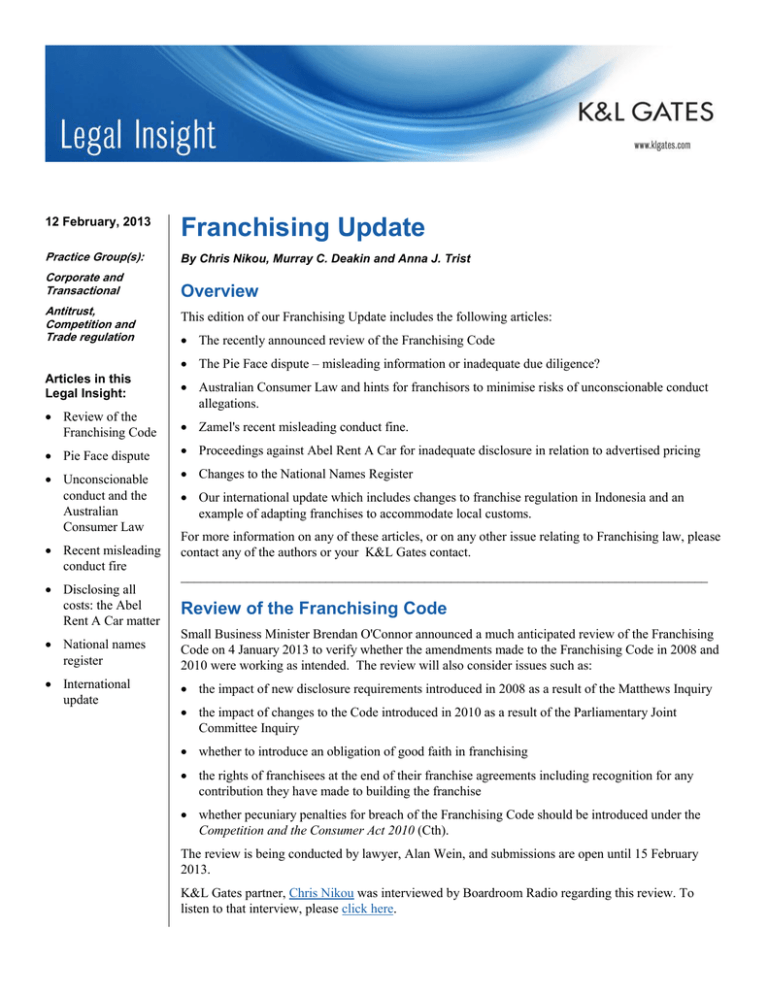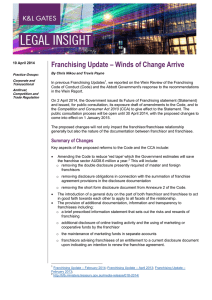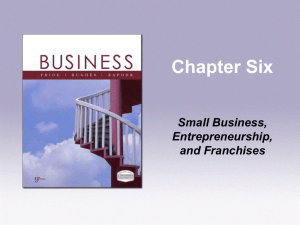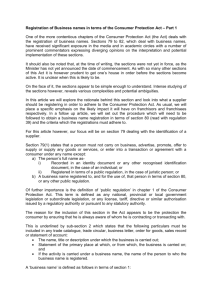
12 February, 2013
Franchising Update
Practice Group(s):
By Chris Nikou, Murray C. Deakin and Anna J. Trist
Corporate and
Transactional
Overview
Antitrust,
Competition and
Trade regulation
This edition of our Franchising Update includes the following articles:
The recently announced review of the Franchising Code
The Pie Face dispute – misleading information or inadequate due diligence?
Articles in this
Legal Insight:
Review of the
Franchising Code
Australian Consumer Law and hints for franchisors to minimise risks of unconscionable conduct
allegations.
Zamel's recent misleading conduct fine.
Pie Face dispute
Proceedings against Abel Rent A Car for inadequate disclosure in relation to advertised pricing
Unconscionable
conduct and the
Australian
Consumer Law
Changes to the National Names Register
Recent misleading
conduct fire
Disclosing all
costs: the Abel
Rent A Car matter
Our international update which includes changes to franchise regulation in Indonesia and an
example of adapting franchises to accommodate local customs.
For more information on any of these articles, or on any other issue relating to Franchising law, please
contact any of the authors or your K&L Gates contact.
________________________________________________________________________________
Review of the Franchising Code
National names
register
Small Business Minister Brendan O'Connor announced a much anticipated review of the Franchising
Code on 4 January 2013 to verify whether the amendments made to the Franchising Code in 2008 and
2010 were working as intended. The review will also consider issues such as:
International
update
the impact of new disclosure requirements introduced in 2008 as a result of the Matthews Inquiry
the impact of changes to the Code introduced in 2010 as a result of the Parliamentary Joint
Committee Inquiry
whether to introduce an obligation of good faith in franchising
the rights of franchisees at the end of their franchise agreements including recognition for any
contribution they have made to building the franchise
whether pecuniary penalties for breach of the Franchising Code should be introduced under the
Competition and the Consumer Act 2010 (Cth).
The review is being conducted by lawyer, Alan Wein, and submissions are open until 15 February
2013.
K&L Gates partner, Chris Nikou was interviewed by Boardroom Radio regarding this review. To
listen to that interview, please click here.
Franchising Update
We will keep you informed of any changes or recommendations that arise from the review.
________________________________________________________________________________
Pie Face Dispute
Three franchisees have stated that they plan to launch legal action to recover millions from the Pie
Face franchisor. The franchisees, according to media reports, allege they were misled over costs and
profits. The franchisor is claiming the franchisees have faced tough retail conditions, but that no
misleading or inaccurate cost information was provided to franchisees. The franchisor has raised
questions as to the management skills of the franchisees in question.
Disputes of this kind involving franchisees are both costly and distracting. To help avoid this
situation, it is important for franchisors to ensure their franchisees conduct a proper and thorough due
diligence before entering the franchise. It goes without saying that franchisors should take care to
ensure that if they give franchisees information regarding costs and profits, that the information is
accurate, based on reasonable grounds, and given with appropriate disclaimers and guidance regarding
how that information has been obtained.
For franchisees, it is important to conduct a thorough due diligence before signing a franchise
agreement and it is vital to obtain independent advice from professionals with experience in
franchising.
We act for franchisors in drafting documentation including disclosure documentation that assists
franchisors to minimise the risk of franchisees later claiming they were misled by inaccurate costs or
profit information. We also assist franchisors with franchisee disputes, including mediations and
litigation where necessary.
________________________________________________________________________________
Unconscionable Conduct and the Australian Consumer Law
The Australian Competition and Consumer Commission (ACCC) recently released a paper on
unconscionable conduct to help businesses comply with the requirements under the Competition and
Consumer Act 2010 (Act). The Australian Consumer Law (ACL) (forming part of the Act) sets out a
number of rights and responsibilities that must be followed by businesses.
The ACL prohibits unconscionable conduct by businesses in their dealings with consumers. Conduct
may be held to be unconscionable if it is harsh or oppressive or if one party knowingly exploits the
special disadvantage of another. There is no requirement for a person to have suffered loss for
conduct to be deemed unconscionable.
The consequences of engaging in unconscionable conduct can include financial penalties, payment of
compensation, having a contract or arrangement deemed void, and requiring a refund to be paid or
specified services performed.
There are numerous factors that will be considered in determining whether conduct is considered
unconscionable. These may include:
the relative bargaining strength of the parties, whether any conditions were imposed on the weaker
party, whether the weaker party could understand the documentation and whether the weaker party
had an opportunity to seek independent advice
2
Franchising Update
the use of undue influence, pressure or unfair tactics and the willingness to negotiate by the
stronger party
the price and other circumstances, under which the weaker party would have been able to purchase
or sell the equivalent goods and services
the applicability of any industry codes and standards (including the Franchising Code)
the extent to which the parties acted in good faith and any other factor that indicates that the
stronger party acted with little regard to conscious.
In 2010, franchisor, Seal-a-Fridge Pty Ltd, was found to have engaged in unconscionable conduct
towards its franchisees by demanding a 50% weekly fee increase for access to a national telephone
number. The national number was relied upon by the franchisees to receive consumer inquiries and
work. The franchisor restricted access to the number to franchisees who did not pay the additional
fee, this forced franchisee into amending their franchise agreements to include the fee increase.
The Court held that the franchisor misused its position and used threats and intimidation which
amounted to unconscionable conduct and that it had failed to comply with disclosure requirements.
It is important that franchisors are aware of the issue of unconscionable conduct, as a result of the
perceived power imbalance between franchisees and franchisors.
Tips for Franchisors
There are measures which can be taken to minimise unconscionable conduct allegations including:
ensuring your contracts are comprehensive, easy to understand and do not contain any unduly
harsh or oppressive terms
ensuring important and unusual terms are clearly disclosed, identified and understood
ensuring franchisees understand their agreements and have sufficient time to consider the
agreements and obtain independent legal advice
abiding by the cooling off period
agreeing to resolve any disputes that may arise in good faith
not rewarding staff for pressure-based selling
ensuring staff have adequate training to understand what is unconscionable so they can avoid any
appearance of unconscionable conduct.
ensuring advertisements are not contrary to the Competition and Consumer Act 2010 (Cth).
_______________________________________________________________________________
Recent Misleading Conduct Fine
The Jewellery Group Pty Ltd, trading asZamel's was ordered by the Federal Court to pay a penalty of
AUD 250,000 for misleading consumers in relation to savings they would make on jewellery. Zamel's
was required to publish corrective notices in newspapers and on its website, as well as implement a
trade practices compliance program, and pay the Australian Competition and Consumer Commission's
(ACCC) costs.
3
Franchising Update
The Court found that Zamel's misrepresented savings consumers would make during its sales. There
were 44 items that were misrepresented in a catalogue, a nationally distributed flyer and online
between November 2008 and May 2010.
Zamel's had advertised its jewellery using the "was/now" pricing technique, for example, "Was
AUD275, now AUD149". This pricing comparison gave consumers the impression that they would
save an amount being the difference between the higher and lower price if the items were purchased
during the sale. That was not the case. It was found that Zamel's had either not sold the items at the
higher price, or that it had sold only a very limited quantity at the higher price before the sale started.
The Court stated that the penalty imposed on Zamel's was intended to deter Zamel's from engaging in
this kind of conduct and to deter other like-minded retailers from engaging in similar conduct. The
ACCC interpreted the penalty as a clear message to businesses that the Court takes a dim view of this
sort of conduct. It said: "The ACCC has taken steps to ensure consumers are not misled as to savings
they may make when retailers advertise goods. In this very competitive market, consumers are
vulnerable to false and misleading tactics and the penalty imposed by the Court today should serve as
a stern warning to other retailers".
We can assist clients with appropriate advertising and often "vet" advertisements for clients to ensure
that the advertisements are not contrary to the Competition and Consumer Act 2010 (Cth).
________________________________________________________________________________
Disclosing All Costs: the Abel Rent A Car Matter
The Australian Competition and Consumer Commission (ACCC) has instituted proceedings against
the operators of Abel Rent A Car (Abel) alleging that the company misled potential customers about
the true cost of hiring some of their vehicles. Abel advertised the price to hire a vehicle which did not
include fees that had to be paid by the consumer (such as an administration fee and a vehicle
registration recovery fee).
The ACCC stated that businesses "cannot advertise a price for their goods or services then later add
additional mandatory fees and charges, which makes the total cost more expensive than initially
represented". The ACCC is seeking declarations, penalties and costs from Abel.
Being involved in litigation is often expensive. We can assist businesses to avoid such litigation by
vetting processes and proposed advertising to ensure that they comply with the law.
________________________________________________________________________________
National Names Register
McDonalds changed its signage at 13 stores across Australia to celebrate Australia Day and we have
taken this opportunity to consider the process of registering a business name under the current law.
This process affects nearly all businesses and it is an important part of all franchise systems which
should be reviewed from time to time.
The national business names register helps to streamline the registration of business names throughout
Australia. The main difference between the previous system and the current national names register is
that registering is now managed by the Australian Securities and Investment Commission (ASIC) and
it is now compulsory to have an Australian Business Number (ABN) prior to registering a business
name.
4
Franchising Update
The national system ensures that a new business name only needs to be registered once in order to
cover all the Australian States and Territories. This helps to minimise the administrative costs for
registering a business name in multiple states/territories.
A key difference to the old system is the processes for transferring and cancelling business names.
Previously a franchisor could require a franchisee to execute a transfer and/or cancellation of business
name form at the time the franchisee entered into the franchise agreement. The form would be held in
escrow throughout the term of the franchise agreement and could be lodged by the franchisor if the
franchisee refused to cooperate thus requiring the franchisee to cease using the business name as and
when required by the franchise agreement.
Under the current system, transfers and cancellations are required to be lodged electronically using a
corporate key, which makes it no longer possible to hold pre-signed cancellation forms in escrow. It
is not clear how ASIC intends to facilitate cancelling franchisee business names in circumstances
where the franchise has ceased to operate or the franchise agreement has been terminated or expired.
The current system also makes it more difficult to cancel and transfer business names where disputes
have arisen.
There is also no requirement for franchisees to provide ASIC with written permission from a
franchisor upon the registration of a business name. This has created some concern that parties will be
able to register a well known franchise business names by simply adding geographical differentiators
after the business name. Franchisors will need to regularly check the register to ensure that only
authorised business names have been registered.
________________________________________________________________________________
International Update
Personalising Your Franchise for the Middle East
Franchise, Planet Beach, has demonstrated the need for franchises to be adapted to the relevant
country with the opening of its latest contempo spa in Saudi Arabia. It has added a new position to the
usual personnel required to operate the spa, a hijab attendant (to hang up women's headscarves, when
it is taken off in the women only spa). A man was not allowed to set foot in the women only spa
which caused some issues with overseeing the build-out of the spa. The touchless technology which
Planet Beach uses for its services is popular in Middle Eastern countries. The master franchisee also
purchased the rights for the United Arab Emirates.
Changes to Franchise Regulation in Indonesia
The Trade Ministry of Indonesia has recently introduced regulations designed to:
protect local businesses
promote locally made products
ensure the broader involvement of other businesses in the current franchise boom in Indonesia.
The general requirements for, and framework to register, a franchise in Indonesia remain unchanged.
The material changes from the new regulations are:
franchisors are not allowed to appoint franchisees that have a controlling/subordinate relationship
with franchisors, either directly or indirectly
5
Franchising Update
a franchisor may not now have control over its franchisees other than through the franchising
agreement and other agreements
at least 80% of the raw materials and/or inventory used by the franchisee must be locally made
(when this requirement is directed at the food and beverage sector it is not yet known how the
assessment as to local content will be made, it is not yet know how this requirement will affect
other sectors)
a franchisor must appoint Indonesian small and medium enterprises either as its franchisees or as
its suppliers, as long as those enterprises meet the criteria set by the franchisor
a franchise must operate in accordance with the technical license granted to it (e.g. if a license is
granted to operate as a convenience store its primary activity must be a convenience store) and
other merchandise or products must not amount to more than 10% of its inventory (this is designed
to ensure zoning and licensing requirements are complied with)
the Ministry of Trade will issue a special logo to identify registered, approved and licensed
franchisors and franchisees and the use of the special logo will be further regulated
if a franchise agreement is terminated before it expires the franchisor may not appoint a new
franchisee unless there has been an agreement between the terminated franchisee and franchisor
that has settled their outstanding obligations and liabilities or a court decision regarding any
dispute.
We can assist franchisors and master franchisees with their international franchises around the world,
including in Indonesia.
Please contact us if you require any assistance with the preparing your franchise agreements for
international expansion or if you are considering looking to take your brand overseas.
Authors:
Chris Nikou
chris.nikou@klgates.com
+61.3.9640.4354
Murray C. Deakin
murray.deakin@klgates.com
+61.2.9513 2335
Anna J. Trist
anna.trist@klgates.com
+61.3.9640.4381
6
Franchising Update
Anchorage Austin Beijing Berlin Boston Brisbane Brussels Charleston Charlotte Chicago Dallas Doha Dubai Fort Worth Frankfurt
Harrisburg Houston Hong Kong London Los Angeles Melbourne Miami Milan Moscow Newark New York Orange County Palo Alto Paris
Perth Pittsburgh Portland Raleigh Research Triangle Park San Diego San Francisco São Paulo Seattle Seoul Shanghai Singapore Spokane
Sydney Taipei Tokyo Warsaw Washington, D.C.
K&L Gates includes lawyers practicing out of 47 fully integrated offices located in North America, Europe, Asia,
South America, Australia, and the Middle East, and represents numerous GLOBAL 500, FORTUNE 100, and
FTSE 100 corporations, in addition to growth and middle market companies, entrepreneurs, capital market
participants and public sector entities. For more information about K&L Gates or its locations and registrations, visit
www.klgates.com.
This publication is for informational purposes and does not contain or convey legal advice. The information herein should not be used or relied upon in
regard to any particular facts or circumstances without first consulting a lawyer.
7
Franchising Update
©2013 K&L Gates LLP. All Rights Reserved.
8






